First page of Hacker News, 9000+ GitHub stars, improved dashboards and documentation - SigNal 17
“Luck is a dividend of sweat. The more you sweat, the luckier you get.” > Ray Kroc
Welcome back to our monthly product updates - SigNal! So happy to share with everyone that we were trending on the first page of Hacker news over the weekend, and the whole team was so upbeat about it.

Last month, we shipped a lot of dashboard and documentation improvements to make SigNoz better for our users. We also participated in conferences, gave talks on open source, and sipped a lot of coffee!
Let us see what humans of SigNoz were up to in the month of September 2022!
What we shipped?
We have been working closely with our users to improve the product experience. Based on their feedback, our team worked both on improving our documentation and the product.
Dashboard Variables
We have enabled dashboard variables to make monitoring complex things easier. You can define any variable and assign values to it. You can then use the variables in queries while creating dashboards.
For example, you can define a variable for different namespaces in the same cluster and then use just a single graph to monitor all namespaces in the single graph. Check out the PR here.
Search with Trace ID
Observability data is often humongous, and some of our users have traces with hundreds of spans. To make navigating their tracing data easier, we have introduced a search component for Trace ID. You can use any Trace ID to list down all the spans related to that trace. Check out the PR here.
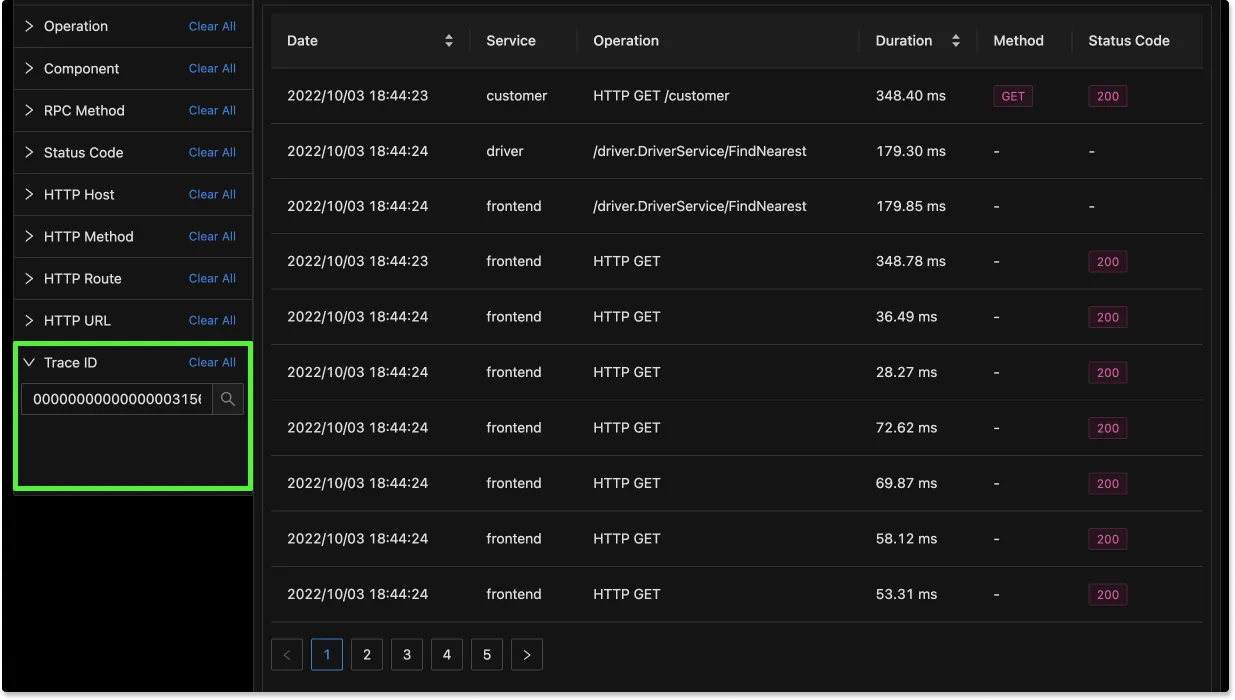
Support for more span attributes
We have enabled support for more span attributes such as arrays (ex: user.ids:["id1", "id2"]). Using these span attributes, application owners can get more context out of their tracing data. Check out the PR here.
Documentation Improvement
Documentation is one of the most important touchpoints in our product usage experience. So we have been improving it to help our users comprehend instructions better. Check out our new instrumentation docs on various programming languages:
We have also published two new tutorials.
OpenTelemetry binary usage in a virtual machine You can deploy OpenTelemetry binary as agents to collect telemetry data from the same Virtual Machines as your application. Check out the tutorial for instructions:
OpenTelemetry Operator Usage OpenTelemetry operator makes it very easy to set up OpenTelemetry Collector and instrument workloads deployed on Kubernetes. Check out the tutorial for instructions on how to use OpenTelemetry Operator:
What’s upcoming?
Our enterprise features are about to be released soon. The first set of enterprise features includes support for SSO and SAML. SAML and SSO support are essential for our enterprise users to enable smooth team collaboration while maintaining a secure authentication process.
We are also working on performance benchmarks for our logs aggregation to guide our users better in handling logs data at scale.
Featured Issue
Deriving more value from Tracing data
One of our users has created good issues around deriving more value out of tracing data.
Grouping spans by custom tags Dashboards for span queriesTracing data has many valuable insights that can be utilized to improve application performance. We support advanced querying on tracing data and the ability to run aggregates like p99 latency across service names, HTTP hosts, and methods. We plan to work on features that will help our users debug their applications faster.
If you have more ideas on utilizing tracing data better, feel free to create an issue to initiate a discussion.
SigNoz News
Made it to the first page on Hacker News
We were trending on Hacker news over the weekend. Our post ended up with 480+ points and 100+ comments. Seeing people so interested in what we’re building is a great feeling.
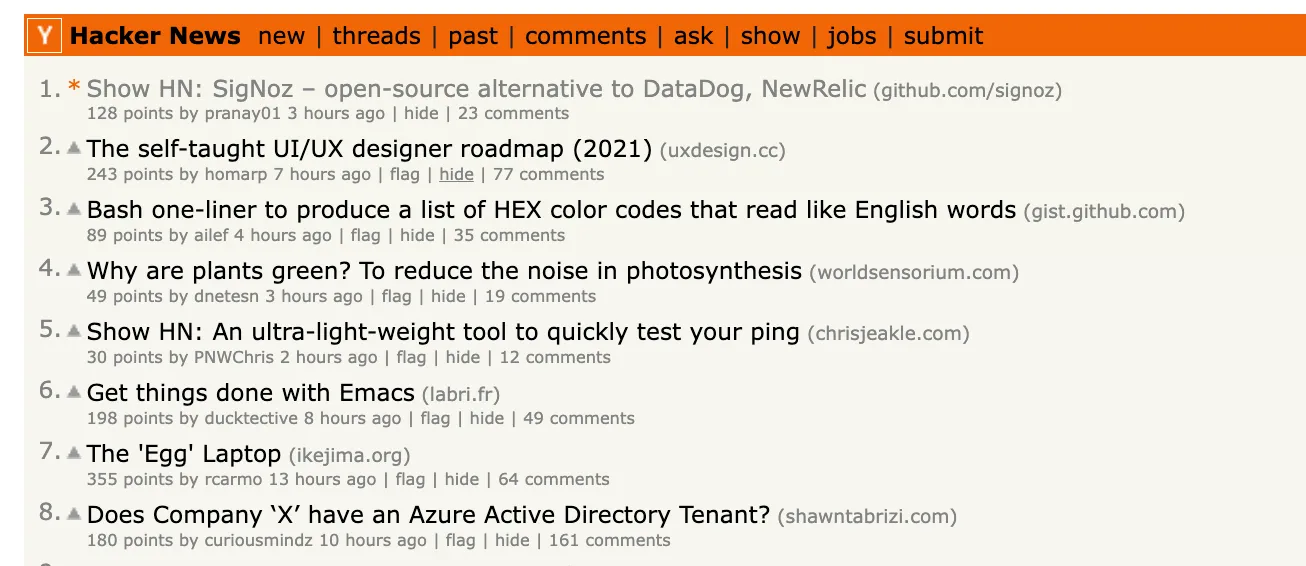
Crossed 9000+ GitHub stars
Thanks to trending on Hacker News, users from all over the world checked out our GitHub repo, and we crossed 9000+ GitHub stars.
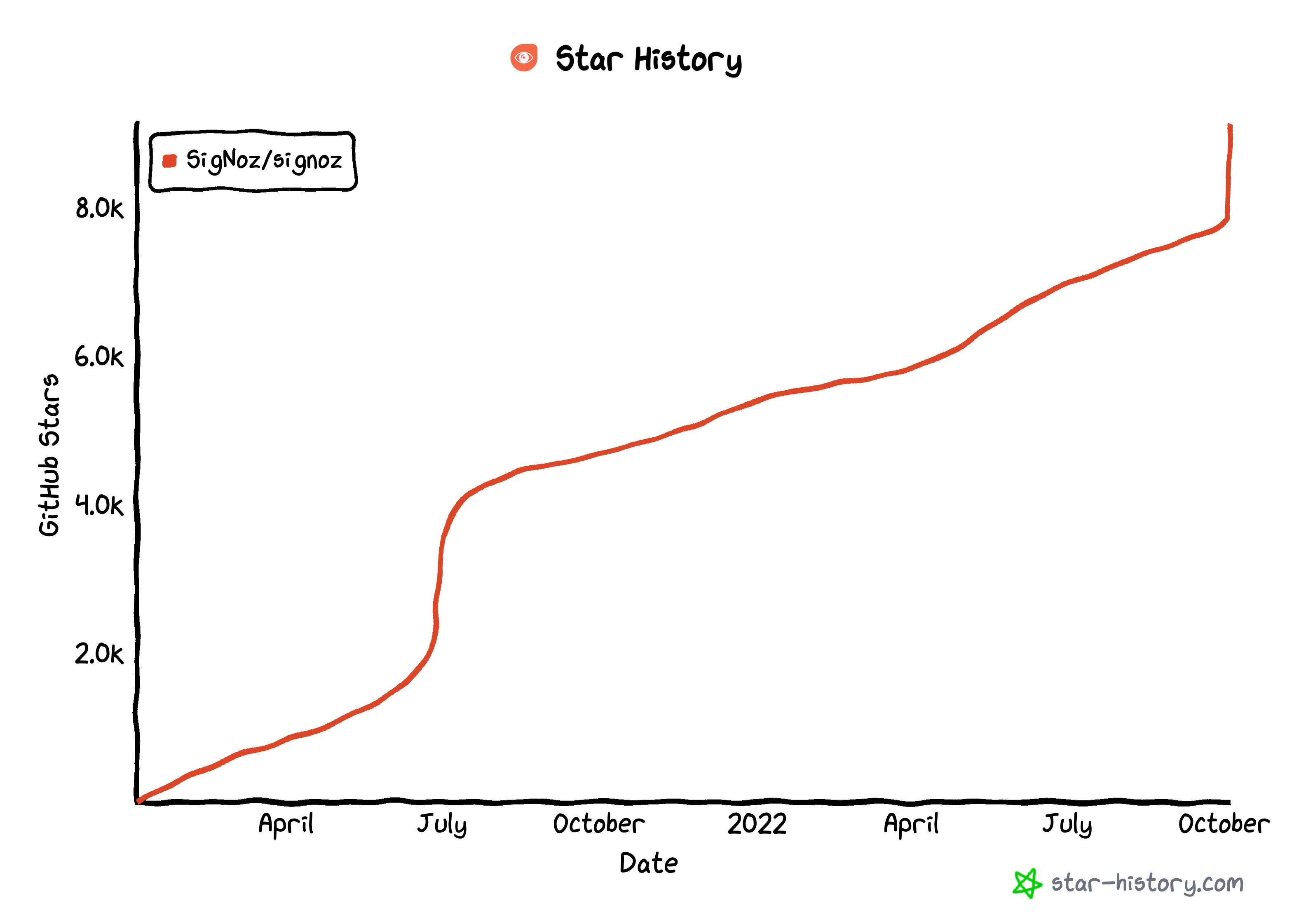
Talk at 19th Open Source India 2022
Ankit Nayan, our CTO and co-founder presented a talk at the 19th Open Source India Conference held in Bengaluru. Ankit talked about the journey of building SigNoz and shared learnings about the open source ecosystem.
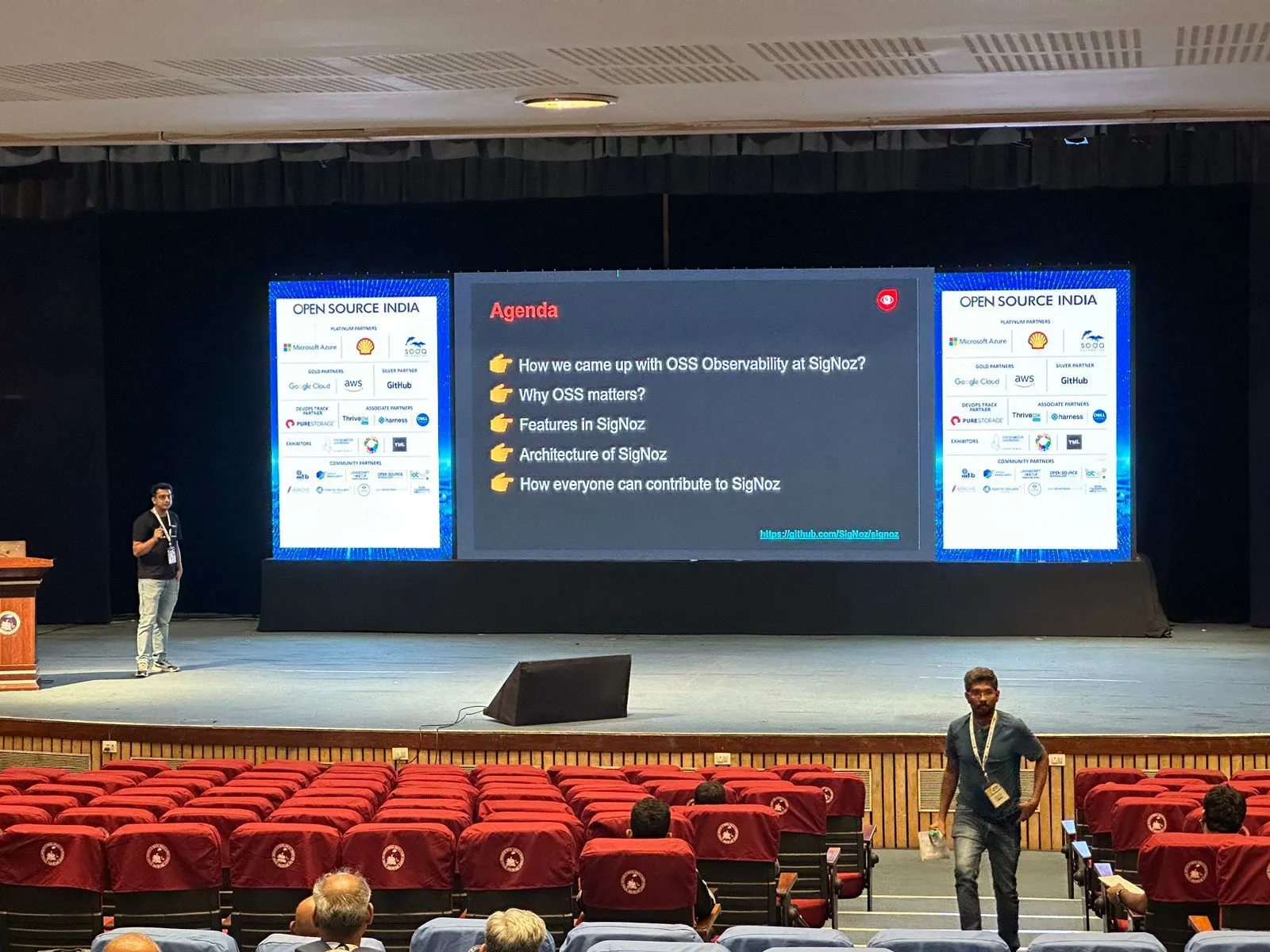
Panel Discussion on OSS
Pranay, our CEO and co-founder participated in a panel discussion on building business around open source projects. Along with Pranay, the panel had Abhishek, co-founder at Appsmith and Pranav, co-founder at Chatwoot. You can check out the entire discussion here:
SigNoz is taking part in Hacktoberfest
Have you been waiting to start making open-source contributions? There can never be a better time than Hacktoberfest. As an open-source project, we are excited to announce that SigNoz is participating in Hacktoberfest! Find out more details here.
Contributor Highlight
Every month, contributors from our community help make SigNoz better. We want to thank the following contributors who made contributions to SigNoz last month 🤗
Customer Stories
Great companies are using SigNoz to solve application performance issues and to implement robust observability for their applications. We sat down to chat with two of our users about how they are using SigNoz to make their applications more performant and resilient.
Instasafe
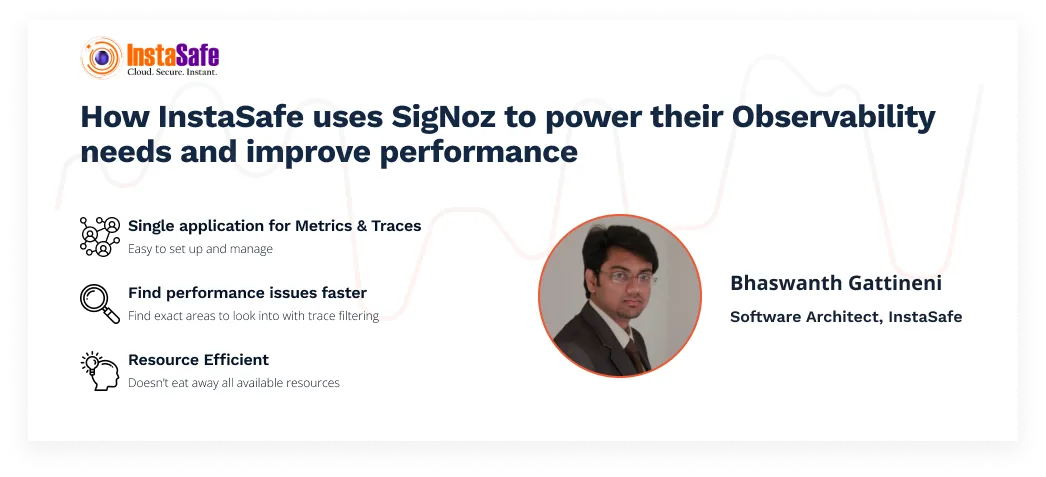
Instasafe, a company that provides zero trust application and network access products for remote teams uses SigNoz to maintain high uptime and to monitor their APIs. Check out the full customer story here.
Blip
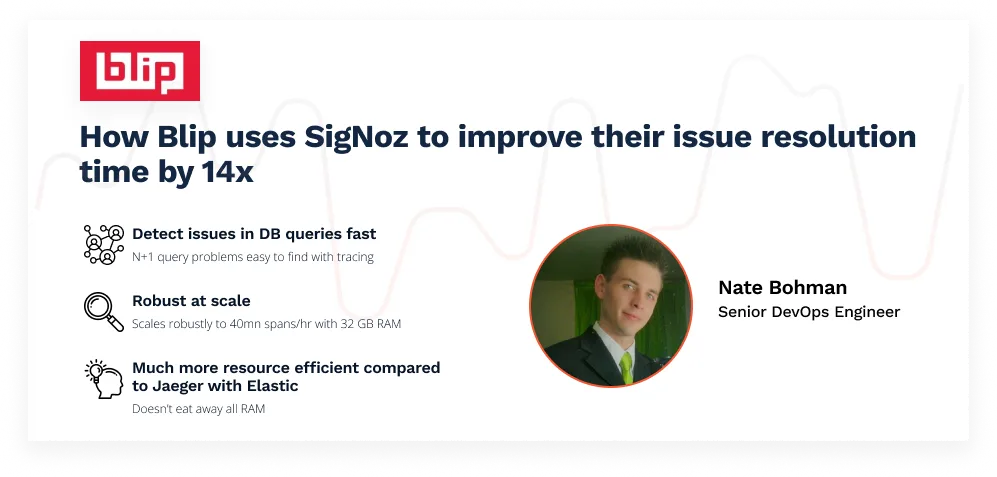
Blip provides self-service subscription-based digital ad space across 1000’s of digital billboards in the US and Canada. Blip used SigNoz to improve their issue resolution time by 14x. Nate Bohman, Senior DevOps Engineer at Blip shared some great insights on how they are using observability to solve hard engineering issues.
From the Blog
Distributed tracing helps you track requests across services and understand issues affecting your application performance. In distributed cloud architecture, debugging performance issues is complicated.
Distributed tracing gives visibility to teams on how a user request performs across different services, protocols, and cloud infrastructure. Read our guide on distributed tracing to understand the important concepts and how to implement them within your application
Complete guide on Distributed Tracing
Thank you for taking out the time to read this issue :) If you have any feedback or want any changes to the format, please create an issue.
Feel free to join our slack community and say hi! 👋

